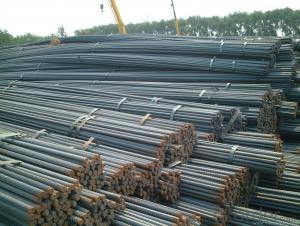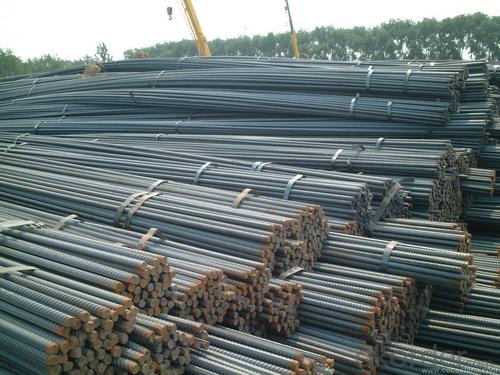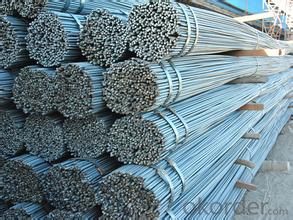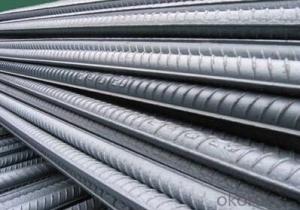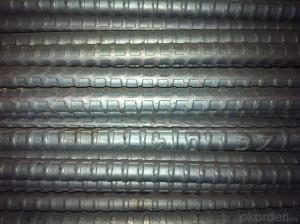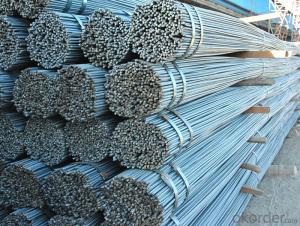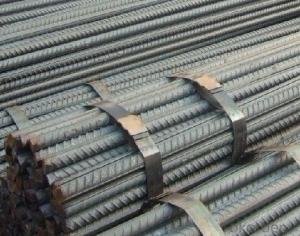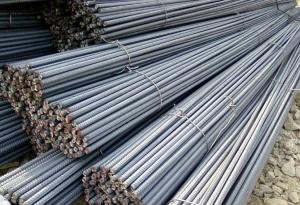Construction Material High Tensile Deformed Rebar 10mm-32mm
- Loading Port:
- Tianjin
- Payment Terms:
- TT or LC
- Min Order Qty:
- 1000 m.t.
- Supply Capability:
- 5000 m.t./month
OKorder Service Pledge
OKorder Financial Service
You Might Also Like
Construction Material High Tensile Deformed Rebar 10mm-32mm
Structure of Construction Material High Tensile Deformed Rebar :
Type | Deformed steel bar/ TMT bars | MOQ | 500 MT (Trial order accepted) |
Standard Grade | GB1499.2-2007, HRB335, HRB400, HRB500. BS4449/2005, B500A, B500B etc.. ASTM A615 Gr.40, Gr60, KS, SD400, SD500 and so on.. | ||
Technique | Hot rolled continuous casting | Length | 6, 9,12m, or as requested |
Size | 6mm-32mm | Payment terms | T/T, L/C at sight, Usance L/C |
Packing | In bundle | Inspection | Third party inspection accepted |
Trade terms | EXW, FOB, CFR, CIF | Trans terms | FIO, FILO, FLT |
Delivery time | 15-30 days, according to the quantity | Note | Customized service is available (for sizes,length and chemical components etc.). |
Main Features of Construction Material High Tensile Deformed Rebar :
HRB335 | Chemical composition | C | Mn | Si | S | P |
0.17-0.25 | 1.0-1.6 | 0.4-0.8 | 0.045 Max. | 0.045 Max. | ||
Mechanical Property | Yield strength | Tensile strength | Elongation | |||
≥335 Mpa | ≥455 Mpa | 17% | ||||
HRB500 | Chemical composition | C | Mn | Si | S | P |
0.25 Max. | 1.6 Max. | 0.8 Max. | 0.045 Max. | 0.045 Max. | ||
Mechanical Property | Yield strength | Tensile strength | Elongation | |||
≥500 Mpa | ≥630 Mpa | 15% | ||||
Specifications Construction Material High Tensile Deformed Rebar :
Deformed steel bar | ||||
Diameter (mm) | Theoretical weight (kg/m) | Pieces/Mt (pcs) | Length (m) | Standard |
6 | 0.222 | 375 | 12 | GB1499-48, HRB335, HRB400, HRB500 BS4449-97, Gr.460B,B500
|
8 | 0.395 | 211 | ||
10 | 0.617 | 135 | ||
12 | 0.888 | 94 | ||
14 | 1.21 | 69 | ||
16 | 1.58 | 53 | ||
18 | 2 | 42 | ||
20 | 2.47 | 34 | ||
22 | 2.98 | 28 | ||
25 | 3.85 | 22 | ||
28 | 4.83 | 17 | ||
32 | 6.31 | 13 | ||
36 | 7.99 | 10 | ||
40 | 9.87 | 8 | ||
50 | 15.42 | 5 | ||
FAQ:
Why choose us:
1. More than 10 years experience in this industry
2. 100,000 tons exporting per month
3. Professional foreign trade team
4. OEM&ODM capacity
5. High quality assured & competitive price
6. Try our best to meet your needs & save your budget
7. Very popular in Southeast Asia, Africa, Mid-East and South America etc.
8. VIP membership system, first time customers and long-term cooperation customers can get extra discount on some products.
Pictures:
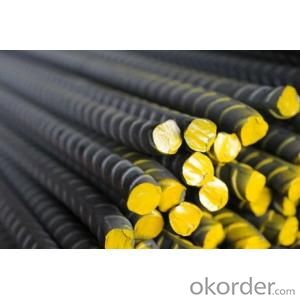
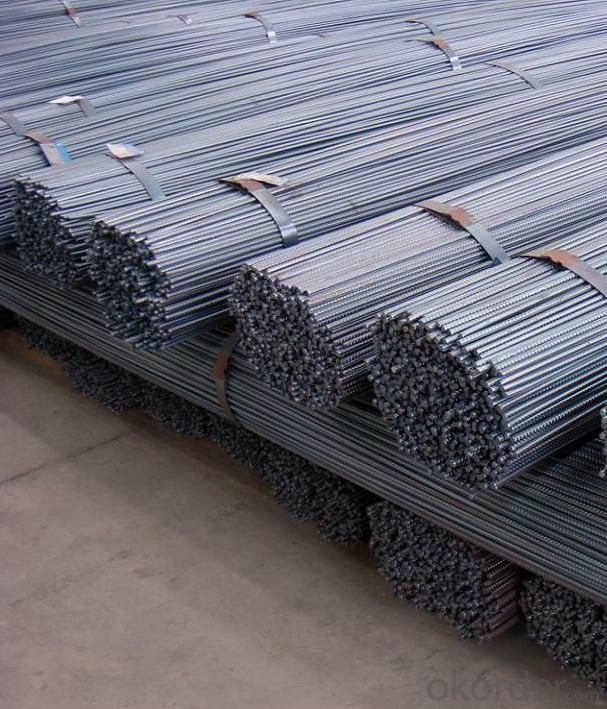
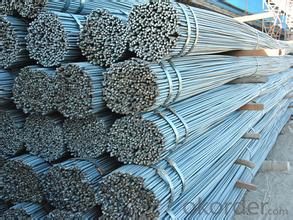
- Q: Can ductile iron pipes be used in high-pressure applications?
- Yes, ductile iron pipes can be used in high-pressure applications. Ductile iron has excellent mechanical properties and high tensile strength, making it suitable for withstanding high-pressure conditions. Its inherent toughness and durability allow it to handle the stress and pressure exerted on the pipes, making it a reliable choice for various high-pressure applications.
- Q: How does ductile iron pipe perform in areas with high traffic loads?
- Ductile iron pipe performs exceptionally well in areas with high traffic loads. Due to its superior strength and durability, it is highly capable of handling heavy loads and withstanding the impact caused by vehicular traffic. Ductile iron pipes have a high resistance to bending and cracking, making them ideal for applications in roadways, highways, and other high traffic areas. The high strength of ductile iron pipe allows it to distribute the weight and pressure exerted by heavy traffic loads more effectively, reducing the risk of deformation or failure. This makes it a reliable choice for transporting water, sewage, and other fluids in areas where heavy vehicles are commonly present. Additionally, ductile iron pipe has excellent corrosion resistance, which further enhances its performance in high traffic areas. It can withstand exposure to various environmental conditions, including moisture, chemicals, and abrasion, without compromising its structural integrity. This makes it a long-lasting and cost-effective solution, as it requires minimal maintenance and has a long service life. Furthermore, ductile iron pipe's smooth internal surface minimizes friction and allows for efficient flow of liquids, reducing energy consumption and maximizing the pipe's hydraulic capacity. This is particularly beneficial in areas with high traffic loads, where the demand for water or wastewater transportation is often greater. In summary, ductile iron pipe is a reliable and durable choice for areas with high traffic loads. Its strength, resistance to bending and cracking, corrosion resistance, and efficient flow characteristics make it an excellent option for transportation systems in roadways, highways, and other heavily trafficked areas.
- Q: Steel plastic pipe, ductile iron pipe, steel pipe difference
- The utility model has the advantages of wide application range, more connecting modes, suitable for most occasions, good sealing property, proper material selection and anticorrosion treatment, and can greatly increase the corrosion resistance.
- Q: Can ductile iron pipes be used for water tunnel crossings?
- Yes, ductile iron pipes can be used for water tunnel crossings. Ductile iron is a strong and durable material that can withstand the pressure and load requirements of water tunnel crossings. Its corrosion resistance and flexibility make it suitable for underground installations, ensuring the safe and efficient transport of water.
- Q: What is the lifespan of ductile iron pipe?
- Various factors, such as pipe quality, installation environment, and maintenance practices, can influence the lifespan of ductile iron pipe. On average, this type of pipe typically lasts between 80 and 100 years. This impressive longevity can be attributed to the inherent durability and strength of ductile iron, enabling it to withstand high pressure, external loads, and environmental conditions. Moreover, ductile iron pipe is often coated with protective linings, such as cement mortar or epoxy, to enhance its resistance to corrosion and extend its lifespan. Regular inspections and maintenance also play a crucial role in prolonging the life of ductile iron pipe by promptly identifying and addressing potential issues. Ultimately, with proper installation, maintenance, and care, ductile iron pipe can provide a reliable and long-lasting service for several decades.
- Q: What are the different coating thickness options for ductile iron pipe?
- The coating thickness options available for ductile iron pipe can vary depending on the specific application and requirements. Typically, there are three commonly used coating thickness options for ductile iron pipe: 1. Standard Thickness: Normally, the coating thickness for ductile iron pipe falls within the range of 200 to 250 microns (8-10 mils). This thickness is generally sufficient to protect against corrosion and abrasion in most soil and water conditions. 2. Increased Thickness: In certain cases, when the pipe is exposed to more aggressive environments or requires a longer lifespan, it may be necessary to use a thicker coating. This can range from 300 to 500 microns (12-20 mils) or even more, depending on the specific requirements. 3. Specialized Coatings: For particularly demanding applications, specialized coatings may be utilized. These coatings offer even greater protection against corrosion, abrasion, or chemical exposure. The thickness of these specialized coatings can vary significantly depending on the specific coating material and application requirements. It is important to emphasize that the selection of coating thickness should be based on a comprehensive evaluation of the environmental conditions, intended lifespan, and any relevant industry standards or specifications. It is advisable to consult with a coating manufacturer or corrosion specialist to determine the appropriate coating thickness for a specific ductile iron pipe application.
- Q: How does the white iron appear in the case of ductile iron?
- If it is to solve the white cast, the casting can be annealed.To prevent a chill in the casting, it is important to know your entire casting process to find the cause and the solution.
- Q: How is ductile iron pipe recycled?
- Ductile iron pipe is typically recycled through a process called reclamation. This involves collecting the used pipe, cleaning and removing any impurities, and then melting it down to form new ductile iron products. The recycled ductile iron can be used to manufacture various items such as new pipes, fittings, and construction materials, providing a sustainable and environmentally-friendly solution for its disposal.
- Q: How does ductile iron pipe perform in corrosive environments?
- Ductile iron pipe is well-known for its exceptional performance in corrosive environments. It has proven to be highly resistant to corrosion due to its unique composition and protective coatings. The primary factor contributing to its resistance is the presence of graphite nodules, which act as a barrier against corrosive agents. These nodules effectively inhibit the spread of corrosion and provide a protective layer for the iron pipe. Additionally, ductile iron pipes often undergo several external coatings and linings to further enhance their resistance to corrosion. These coatings, such as cement mortar lining or epoxy coatings, provide an additional layer of protection against corrosive substances. They create a barrier between the pipe and the surrounding environment, preventing the corrosive agents from reaching the iron surface. Furthermore, ductile iron pipes are highly durable, which adds to their performance in corrosive environments. They have a long life expectancy and can withstand high-pressure conditions, making them suitable for various applications. The inherent strength of ductile iron makes it less susceptible to damage, even in harsh environments. It is important to note that while ductile iron pipes exhibit excellent resistance to corrosion, the specific performance can vary depending on the nature and concentration of the corrosive substances present. In extremely aggressive environments, additional protective measures such as cathodic protection or sacrificial anodes may be required to ensure long-term durability. Overall, ductile iron pipe has a proven track record of performing exceptionally well in corrosive environments. Its unique composition, combined with external coatings and linings, make it a reliable choice for applications where corrosion resistance is crucial.
- Q: What is a graphite cast iron pipe?
- It should be the ductile iron pipe. You can check it again.
Send your message to us
Construction Material High Tensile Deformed Rebar 10mm-32mm
- Loading Port:
- Tianjin
- Payment Terms:
- TT or LC
- Min Order Qty:
- 1000 m.t.
- Supply Capability:
- 5000 m.t./month
OKorder Service Pledge
OKorder Financial Service
Similar products
Hot products
Hot Searches
Related keywords
